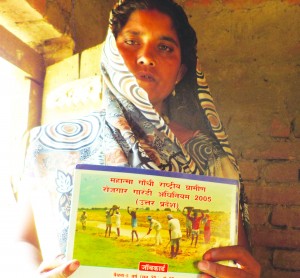While the current government at the Centre debates whether or not the Mahatma Gandhi National Rural Employment Guarantee Act is worth investing in, ground realities suggest that district administrations and State governments are showing little interest in making the scheme work. In Chitrakoot and Mahoba dsitricts of Bundelkhand, non payment of wages and the cavalier attitude of the local administration has meant that people in a number of villages are slowly giving up on benefiting from the scheme.
In Mahoba‘s Sunaicha village, at least 10 people who have been working on the construction of a road under the NREGA have alleged that they have not been paid for their work for 5 months. They submitted an application with respect to this matter to the Tehsildaar on 2 June. ‘Construction started in 2014,’ said Brijrani who was at the forefront of the group that signed the application demanding their dues. ‘People have worked without being paid for several weeks. Amounts owed to them vary from 3,000 to 6,000 rupees,’ he said. Brijrani’s entire family had been working here to make ends meet. ‘Altogether, we have worked for enough days to be paid at least 10,000 rupees. This isn’t the first time we have raised the issue. But whoever we approach blames someone else.’
Brijrani and several others have alleged that the Secretary of the panchayat has pointblank refused to pay them. When contacted, Sudarshan, the Secretary said that the mate (supervisor) at the worksite was to blame. ‘The mate is supposed to maintain a record of who works how much at the worksite. Bhujbal, the mate in Sunaicha village, has made entries in other people’s job cards so they can get money and he can make a commission from their earnings.’ Bhujbal in turn blamed the Secretary and Junior Engineer saying that they were responsible for siphoning off the money that was meant for the workers.
Sunaicha is not the only village where non payment of wages has resulted in work being suspended under the NREGA. Harassment, scams and delays have been recorded all over the country. According to data available with the Ministry of Rural Development, as of January 2015 over 70% wages had not been paid on time under the scheme. This delay in payment despite the fact that workers can claim a nominal compensation if they are not paid within 15 days of work.
 In Chitrakoot district, with the agricultural cycle being severely affected by unseasonal rains, demand for work under the NREGA has gone up but local administration has failed to respond to this demand. As the 5-year plan comes to an end, people in Amwa village have alleged that despite repeated demands for work, the village head has not brought in any work under NREGA.
In Chitrakoot district, with the agricultural cycle being severely affected by unseasonal rains, demand for work under the NREGA has gone up but local administration has failed to respond to this demand. As the 5-year plan comes to an end, people in Amwa village have alleged that despite repeated demands for work, the village head has not brought in any work under NREGA.
‘Our job cards are blank. No work has happened in the village. My husband had to leave and has migrated to Punjab to make a living,’ said Urmila. She and her neighbour Ram Dulari have both demanded work under the NREGA but no project was started in the village. Shivlalli, also a resident of the village said, ‘If they would get the scheme working in the village, people would not have to leave their families and move to earn a living.’
Dwarka Prasad, the village head, said that in a population of 3000 people, only 300 have job cards. ‘I have tried to ensure that more families get the opportunity to work.’ When Ramnagar’s Block Development Officer (B.D.O.) Rakesh Saini was asked to comment on the gap between the demand for work and its availability, he in turn blamed the people and said, ‘People themselves are unwilling to work under the NREGA. They have often complained that the wages are too low.’
The last time NREGA wages were revised was in March 2015 when at the beginning of a new financial year, the wage rate for Uttar Pradesh was fixed at a measly 161 rupees a day. Incidentally, this is the third lowest wage rate (Madhya Pradesh and Chhattisgarh have a wage rate of 159 rupees per day).